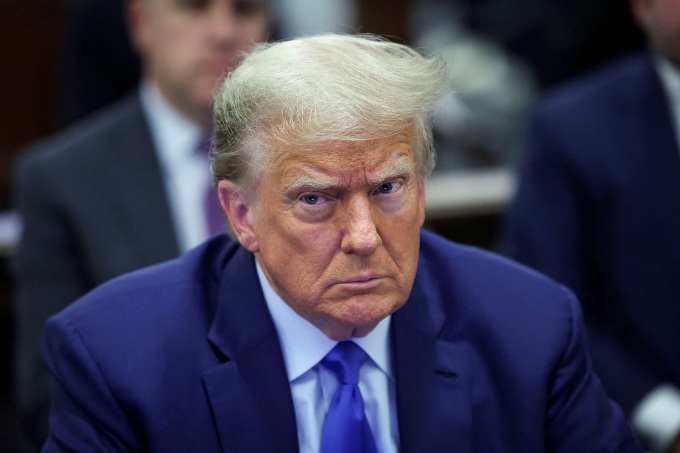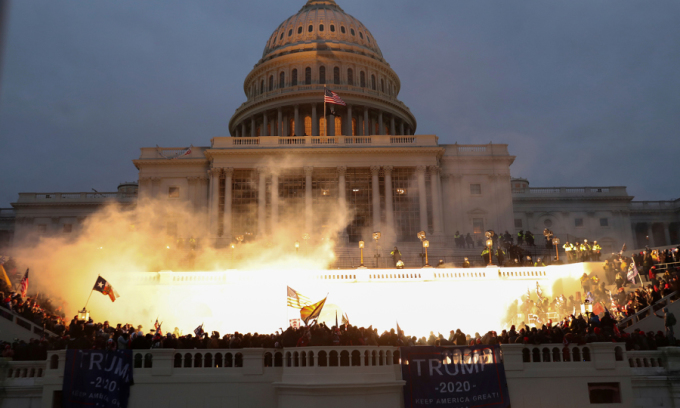Several US states are suing Trump under the 14th Amendment, which provides for the crime of "insurrection," which could disqualify him from the presidential race.
On October 30, the Denver District Court in Colorado began hearing a lawsuit filed by six voters in September, accusing Donald Trump of "engaging in an unconstitutional insurrection" during the Capitol Hill riot on January 6, 2021. The plaintiffs argued that this made Mr. Trump unable to continue holding a position in the government under Section 3 of the 14th Amendment.
This amendment, passed in 1868, states that no one can hold public office if they have been involved in "insurrection or rebellion." It was enacted after the Civil War to prevent members of the Confederacy from holding public office.
This is the basis for Trump's opponents to file lawsuits in a series of states, including Colorado, Minnesota, New Hampshire, Arizona and Michigan, arguing that the former president is not eligible to run for office, as he tried to overturn the 2020 election results and had a role in "inciting the riot" at Capitol Hill.

Former President Donald Trump at the Supreme Court of New York State, USA on October 24. Photo: Reuters
The Colorado and Minnesota cases are getting the most attention because they are moving the fastest. The Denver District Court is expected to rule by November 23, while the Minnesota Supreme Court is scheduled to hold oral arguments on November 2.
Minnesota court judges are required by state law to issue a ruling as soon as possible, but can send the case to a lower court judge to complete the record before making a final decision.
The idea of using a constitutional legal tool to block Mr. Trump from running again has gained support from many liberals and conservatives in the United States. Many voters are pursuing the lawsuit with the support of watchdog groups like Citizens for Responsibility and Ethics in Washington and People’s Free Speech.
The lawsuits must move quickly because the election season is fast approaching, with Iowa’s primary scheduled to begin on January 15, 2024. Many courts could rule by then, but the cases will become more complicated as primaries are held throughout the spring. The Republican National Convention is scheduled to begin on July 15, and all sides hope to have the issue resolved before then.
The Minnesota case began in the state Supreme Court, and cases elsewhere are likely to go to each state’s highest court. State Supreme Court decisions can be appealed to the U.S. Supreme Court. The U.S. Supreme Court can take up cases if it wants to, but it is not required to do so.
Legal experts say the US Supreme Court will not intervene if states allow Mr. Trump’s name to appear on the ballot. But the court will certainly get involved if any state blocks Mr. Trump from running.
Section 3 of the 14th Amendment has rarely been invoked in more than a century. But in recent years, amid the divisiveness of American politics , it has become more common. Last year, lawsuits challenging the provision against two Republican senators, Madison Cawthorn and Marjorie Taylor Greene, failed to keep them from appearing on the ballot.
However, a New Mexico judge last year invoked the provision to remove Otero County Commissioner Couy Griffin from office for his role in the Capitol Hill riots. The judge determined that Griffin, who founded the group Cowboys for Trump, was no longer eligible to hold office because he violated Section 3 of the 14th Amendment. It was the first time the provision had been used to remove a U.S. official since 1869.
To remove Trump from the ballot, the plaintiffs need to prove that his actions satisfy the conditions set out in Section 3. However, observers say that Trump and his supporters have many grounds to oppose the idea of using this provision to prevent him from running for re-election.
Section 3 only prohibits the insurrectionist from “taking office,” but there is no mention of running for office. Trump’s lawyers could use this to argue that a judge cannot remove his name from the ballot. If he wins, only the US Congress has the right to confirm his eligibility to hold office.
Section 3 states that it applies to senators, representatives, electors, and members of “state and federal offices.” This “federal office” status is the sole basis on which the plaintiffs are asking the court to apply the title to the president in their lawsuit against Mr. Trump.
However, Trump's lawyers are likely to argue that the "office" position in Section 3 applies only to military officers or postal service employees, not to the position of president.

Trump supporters gathered in front of the US Capitol building, waving national and Trump flags as lawmakers met to certify Joe Biden's victory on January 6, 2021. Photo: Reuters
They may also say that the Capitol Hill riots were not “insurrection,” noting that the former president has not been charged with insurrection by any court. Trump was also acquitted by the Senate after the House of Representatives impeached him for inciting the insurrection.
Even if it was an insurrection, Trump could not be convicted because he did not participate and was not present on Capitol Hill at the time, the lawyers added.
Trump supporters say Congress, not judges, should determine who is fit to be president. The courts cannot block Trump from running again if two-thirds of Congress votes to determine his fitness to serve.
Trump supporters also argue that Section 3 of the 14th Amendment is invalid without a federal law that specifically outlines how it should be enforced. The United States currently has no such law, so they argue that the provision cannot be used to remove Trump from the ballot.
But opponents say Section 3 is perfectly applicable, because the US Constitution and state laws give election officials and courts the power to decide who appears on the ballot.
The Colorado trial is the first time Section 3 of the 14th Amendment has been used against a presidential candidate, and the judge will have to clarify the parties' arguments to decide whether Mr. Trump can run for president in 2024.
"This is the first domino. If it falls, it could cause a chain reaction in many other states in the US. We have never seen such a legal challenge to a presidential candidate," said Derek Muller, an election law expert at Notre Dame Law School in the US.
Thanh Tam (According to Washington Post, CNN, ABC News )
Source link

























































![[VIDEO] 5 years a term – Testing the power of political belief.](https://vphoto.vietnam.vn/thumb/402x226/vietnam/resource/IMAGE/2025/7/31/80f3cf00b5224fcc8eb4f07754be2233)










































Comment (0)